In an important cultural gesture, the Academy of the Kingdom of Morocco, in partnership with the Pan African Writers Association (PAWA), organized a round table entitled “Africa celebrates Wole Soyinka in Morocco,” at the academy’s headquarters, to mark the 90th birthday of Nigerian writer Wole Soyinka, the first African to win the Nobel Prize in Literature (1986).
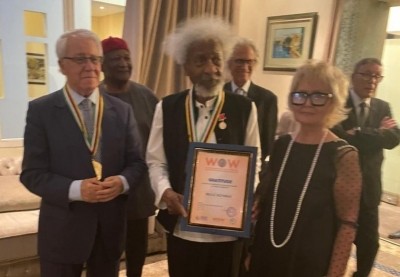 During this occasion, Professor Soyinka received the shield of the Academy of the Kingdom of Morocco from Abdeljalil Lahjamri, Permanent Secretary of the Academy, for his “decades of literary experience, during which he championed creativity on the continent, freedom, and the rejection of racism within the African component, which enabled him to win the Nobel Prize for literature about 38 years ago.”
During this occasion, Professor Soyinka received the shield of the Academy of the Kingdom of Morocco from Abdeljalil Lahjamri, Permanent Secretary of the Academy, for his “decades of literary experience, during which he championed creativity on the continent, freedom, and the rejection of racism within the African component, which enabled him to win the Nobel Prize for literature about 38 years ago.”
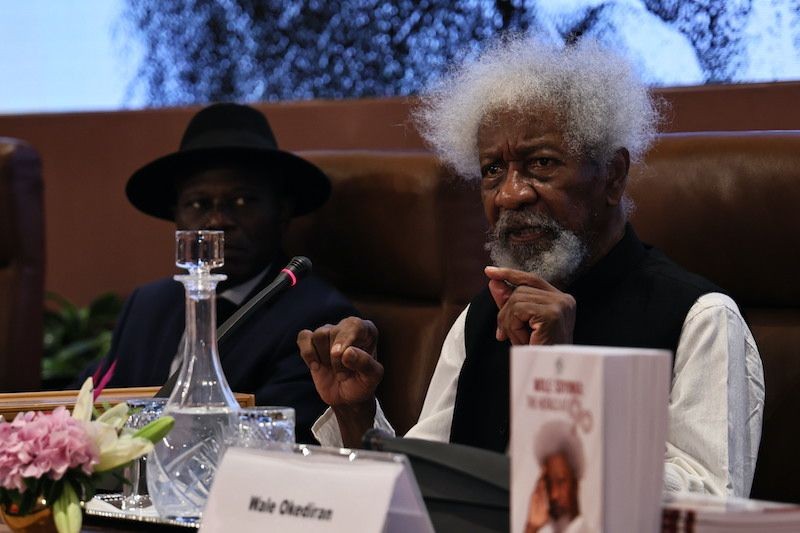 Poetess Margarita Al President of the World Organization of Writers - also presented WOW Gold Medal to the great writer "for his contribution to the development of world literature." Soyinka also received the shield of the Association of Authors of Nigeria (ANA).
Poetess Margarita Al President of the World Organization of Writers - also presented WOW Gold Medal to the great writer "for his contribution to the development of world literature." Soyinka also received the shield of the Association of Authors of Nigeria (ANA).
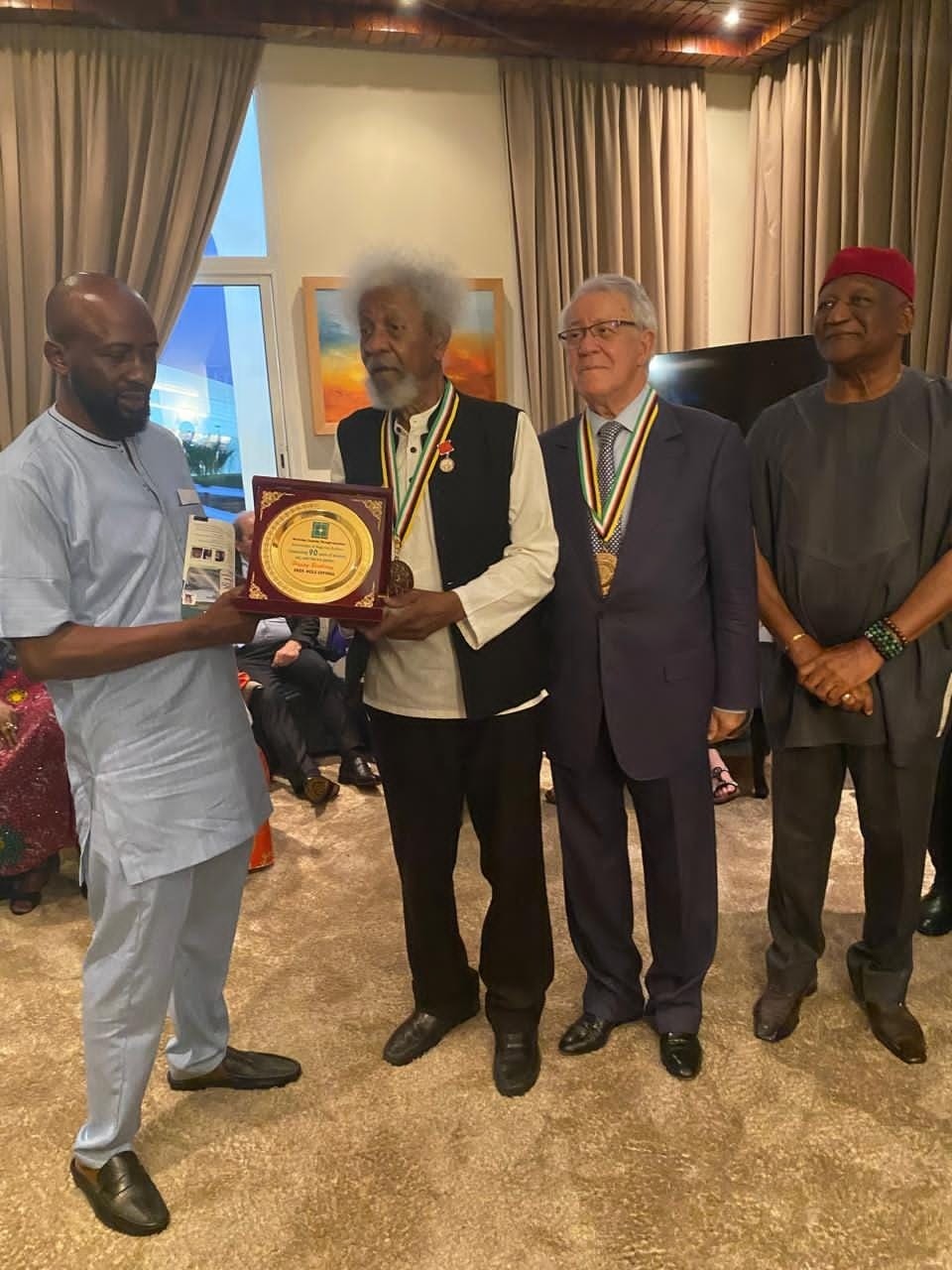 The massive ceremony was attended by members of the Academy, the Pan African Writers Association (PAWA), in the presence of the Secretary General of the association, Dr. Wale Okediran, along with Moroccan writers and university students, in the Great Hall of the Academy.
The massive ceremony was attended by members of the Academy, the Pan African Writers Association (PAWA), in the presence of the Secretary General of the association, Dr. Wale Okediran, along with Moroccan writers and university students, in the Great Hall of the Academy.
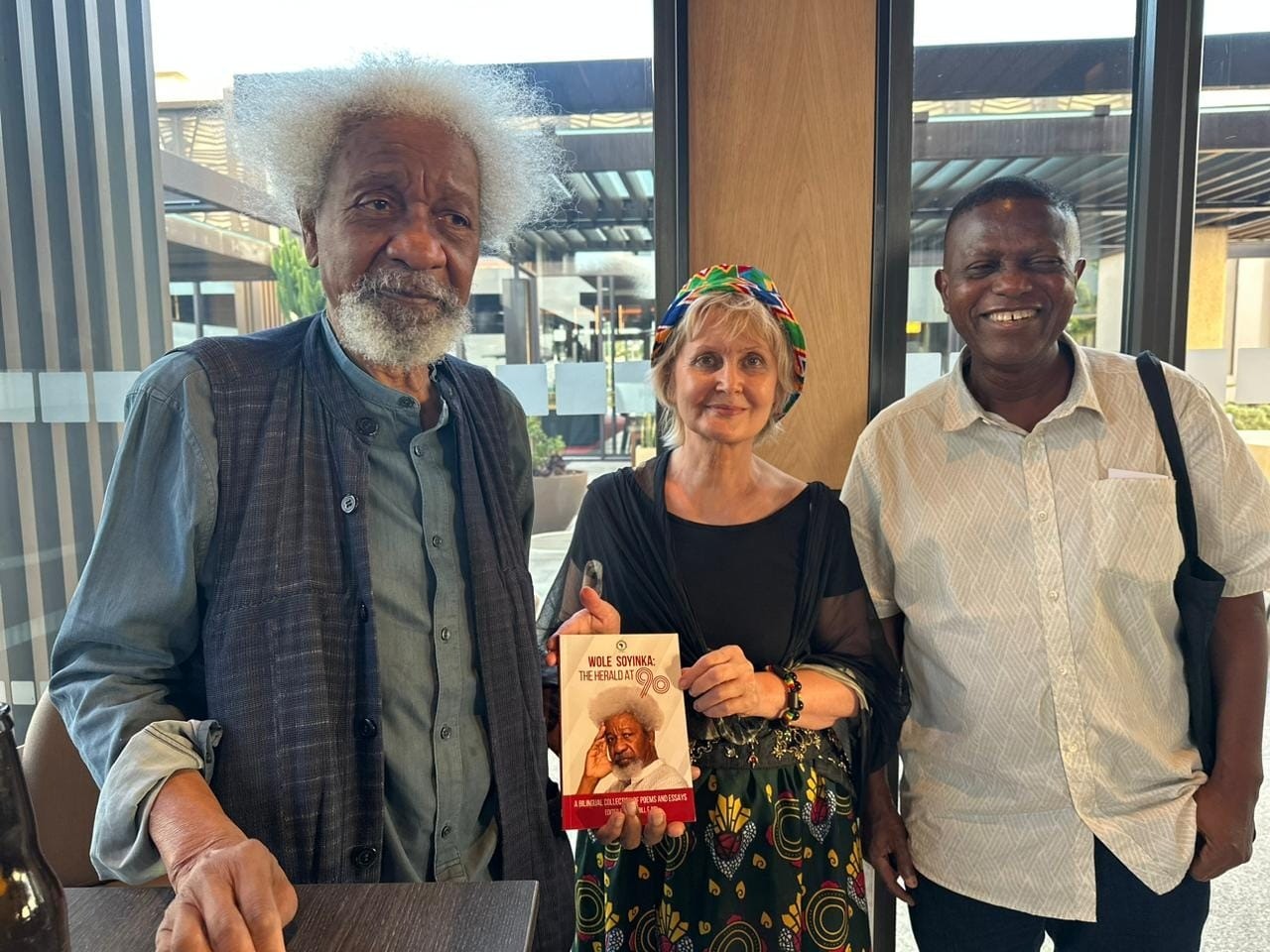 The Kingdom’s guest was poetically celebrated by the voices of male and female Moroccan university students who performed some of Soyinka’s poems. Immortal, as mentioned by the editor of the Hespress report published by Abdelaziz Ikram, the participation of Omaima Benali and Daha Mestati from the Moulay Ismail University in Meknes, and Nabila Talal and Roquia Sabri from the Hassan II University in Mohammedia, while Narges Bakkali and Linasoa Mahirinernina represented the International University of Rabat.
The Kingdom’s guest was poetically celebrated by the voices of male and female Moroccan university students who performed some of Soyinka’s poems. Immortal, as mentioned by the editor of the Hespress report published by Abdelaziz Ikram, the participation of Omaima Benali and Daha Mestati from the Moulay Ismail University in Meknes, and Nabila Talal and Roquia Sabri from the Hassan II University in Mohammedia, while Narges Bakkali and Linasoa Mahirinernina represented the International University of Rabat.
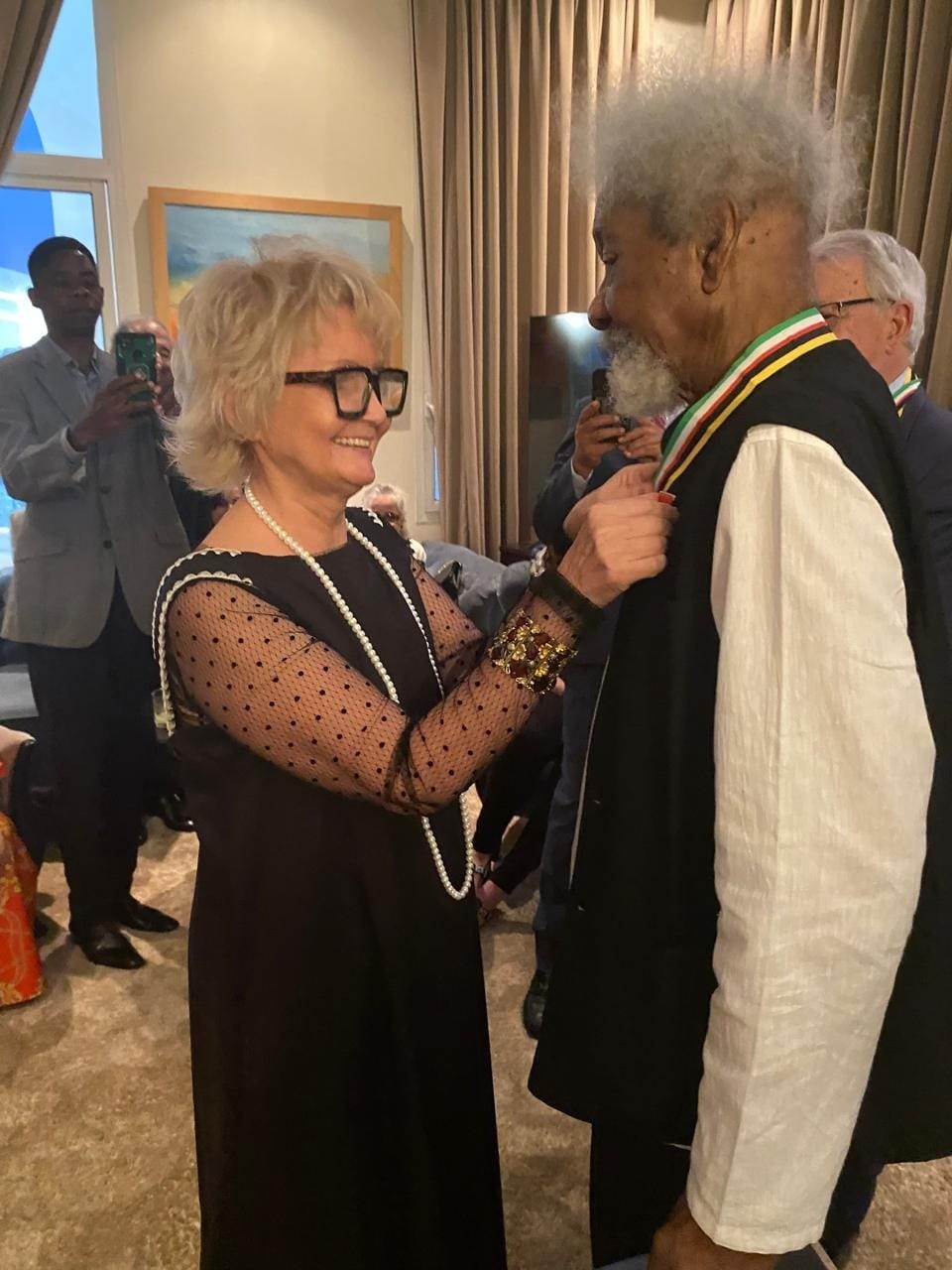 The session celebrating Wole Soyinka began with a speech by Abdul-Jalil Al-Hajamari, Permanent Secretary of the Kingdom’s Academy, during which he presented the manifestations of Soyinka’s literary excellence on the grounds that he is “the most prominent contributor to thinking about issues of humanity and the African continent, and also as an exceptional literary figure who hails from an exceptional geography.”
The session celebrating Wole Soyinka began with a speech by Abdul-Jalil Al-Hajamari, Permanent Secretary of the Kingdom’s Academy, during which he presented the manifestations of Soyinka’s literary excellence on the grounds that he is “the most prominent contributor to thinking about issues of humanity and the African continent, and also as an exceptional literary figure who hails from an exceptional geography.”
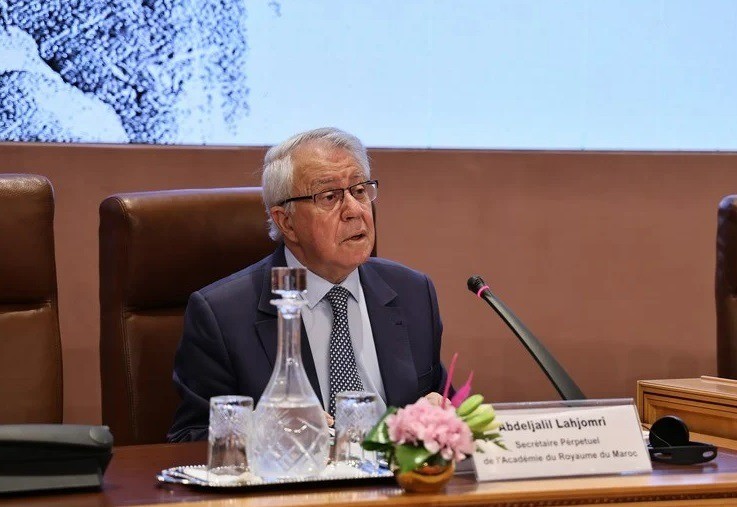 Al-Hajamari stressed that “it is very important to hold such an event that is of interest to Wole Soyinka and literary creativity in Africa in general, which falls within the framework of the interests of the Kingdom Academy and the manifestations of Morocco opening its doors to various African literary and cultural references, as well as being one of the moments of recognition of creators and the advancement of various generations to get to know Soyinka.”
Al-Hajamari stressed that “it is very important to hold such an event that is of interest to Wole Soyinka and literary creativity in Africa in general, which falls within the framework of the interests of the Kingdom Academy and the manifestations of Morocco opening its doors to various African literary and cultural references, as well as being one of the moments of recognition of creators and the advancement of various generations to get to know Soyinka.”
The Permanent Secretary of the Kingdom Academy returned to point out that the Nobel Laureate of Literature remains “a researcher and investor in culture and literature, a defender throughout his decades of experience of freedom, an opponent of racism and apartheid, and a creative link between the past, the present and the future, in addition to defending creative writing and creators at the continental level.” Considering poetry as “the most important elements in daily life, which confirms the importance of celebrating African creators with the African Writers Association.”
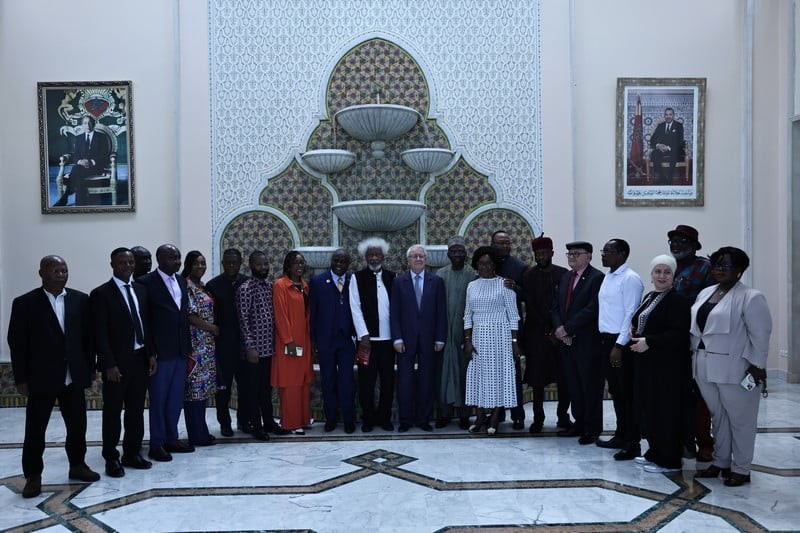 For his part, Eugene Ebode, Director of the Chair of African Literature at the Kingdom Academy, stressed that “Soyinka is an exceptional man and a great writer whose literary strength was confirmed after he won the Nobel Prize for Literature in 1986. He deserves full attention and appreciation, which is what the Kingdom Academy does, which encourages creativity and works to value it whenever possible.” “It’s about the continent’s creators.”
For his part, Eugene Ebode, Director of the Chair of African Literature at the Kingdom Academy, stressed that “Soyinka is an exceptional man and a great writer whose literary strength was confirmed after he won the Nobel Prize for Literature in 1986. He deserves full attention and appreciation, which is what the Kingdom Academy does, which encourages creativity and works to value it whenever possible.” “It’s about the continent’s creators.”
Ebode continued: “The writer we are talking about today opened the door to creativity on the continent, and it is very natural that he is among us today within the Kingdom Academy, especially if we recall the intellectual aspects that he touches on in his literary works and publications throughout the decades of his experience in this field, especially when he worked On the themes of freedom and power in a creative way.”
While he spoke at length about the creative aspects of Soyinka’s personality, the Director of Arts, Chair of African Literature, considered that “Wole’s intelligence also appeared when he welcomed the participation of creative people in this ceremony in order to provide them with the opportunity, as this, according to him, remains a literary sharing between creative people and students and an example that serves creativity,” pointing out that “Humanity requires recognition of this African stature,” he described today’s event as “celebrating an exceptional man within the confines of an exceptional academy.”
From his standpoint as a university professor in the United States of America, Bill Effendi praised “the Kingdom Academy’s initiative to organize this important event that celebrates the career of Wole Soyinka on his eighty-ninth birthday.” He considered this “a celebration of one of the most prominent sons of the African continent, given that he is a leader of continental literature and a role model.” For the creators of the new generation.”
Effendi added: “As those interested in literary affairs on the continent, we consider that Soyinka remains a cultural, creative and humanitarian reservoir and a reference for those interested in literature at the continental level. He is a supporter of the truth and deserves to be taken as a role model for creativity,” noting that “it is beautiful and important that such demonstrations are held in the Kingdom, and this is what both Morocco and the Kingdom Academy should be thankful for,” noting at the same time that “Soyinka also remains one of the most prominent sons of the continent.” “Whose creativity and literary clarity have been praised by international political leaders in their many works.”
This event comes in the presence of a number of prominent figures in the cultural, academic and diplomatic circles, and reflects the wise policy of His Majesty King Mohammed VI towards the African continent, which aims to enhance African integration and consolidate the bonds of South-South cooperation, based on the unity of destiny and cultural diversity of the African peoples.
The Academy of the Kingdom of Morocco aims, through this meeting, to highlight African literary creativity at the global level and to value the rich cultural heritage of the African continent, by highlighting the career of one of its most prominent literary figures, Wole Soyinka, who enriched the cultural scene with his works that discuss crucial issues in a literary style. High, characterized by sarcasm and humor.
Margarita Al, President of the World Writers Organization, participated in the official reception at the Royal Moroccan Academy in Rabat, and during the ceremony she conveyed her happiness to WOW members: “This is history now. It is the history of the World Organization of Writers. We have honored Nobel laureate Wole Soyinka. It is an honor. I would like to congratulate the genius writer on his ninetieth birthday.”
Wole Soyinka praised the Kingdom Academy’s celebration of him, and “the Moroccan interest in the continent’s creators and highlights Rabat’s keenness to interact with its African surroundings and depth, especially in the cultural and literary aspect.”
Soyinka said, in his speech as part of the Kingdom Academy’s celebration of his birthday, which falls in the middle of this month, that “this initiative represents a second opportunity to strengthen relations between Rabat and Africa on the cultural level,” adding: “My relationship with this country is not born today, but dates back to history.”
The writer continued: “It is very nice to come with you today while you are celebrating me here in Morocco, and it is also nice to hear your testimonies. I am not here to give lessons or notes, but rather to hear the creative poets and writers of Morocco and Africa in general, and to hear youth poems as well in the words of “The students who are with us here.”
“They often ask me about the purpose of all my literary experience, as I am today on the verge of ninety years of age, but I usually answer that I lived an experience that enabled me to use literature and writing as a means of expression, especially in Nigeria, where I witnessed a number of stages that witnessed events affecting humanity.” In general,” Soyinka continues, before stressing that “today’s demonstration deserves to re-ask a number of questions about the relationship of literature to rights and humanity.”
Speaking about his experience before members of the Kingdom Academy and the Pan African Writers Association, the Nigerian writer said: “What motivated me over the past years is that I was inspired by a number of elements, including the duality of power and freedom, which African society in general knows is a set of aspects that prompt more attention to it.” He added, “Humanity remains directly connected to these two elements, especially as we face rapid developments globally.”
The winner of the Nobel Prize for Literature in 1986 affirmed that “the world today knows the spread of domination and encourages it, at a time when this cannot be allowed or encouraged by colonialism, but rather by stimulating and supporting ways of coexistence and humanity, because in the end class cannot and cannot create for us an ideal society.” It also creates social development for us.”
Referring to what is happening in a number of African countries, he returned to emphasizing “the necessity of rejecting dictatorship and tyranny, no matter how autocratic or secular the state is, as well as uniting peoples instead of distinguishing them from each other by adopting certain determinants, especially the religious determinant, which we must not differentiate by using it.” Among members of society, in the end we remain people.”
Speaking about tyranny and the dangers of power, Soyinka asserted that “earlier, Nigeria was experiencing a struggle for power between factions and political and irregular organizations, which remained the opposite of freedom and humanity, which I had always proposed in my writings throughout my experience in the past decades.”
In expressions of joy and gratitude in front of hundreds of people who filled the great hall of the Kingdom Academy’s headquarters, the Nigerian literary icon recorded that “it is a matter of pride to be celebrated here in Morocco in front of the masses of creatives and writers on the continent, which contributes to strengthening our cultural relations and developing our common values,” and added: “And It was important for Morocco to show its attention to the continent’s creators, but we regret that African writers still do not benefit from privileges and incentives, which is something we cannot accept as we seek development.” They considered the event “a good opportunity for Morocco to strengthen its cultural relations with abroad.” It is important that this is his victory for humanity.”
It is noteworthy that Wole Soyinka, born in Abeokuta, Nigeria, on July 13, 1934, is considered one of the most prominent playwrights in Africa. He studied in Nigeria and England, and gained practical experience in the field of theater through his work at the Royal Court Theater in London.
Soyinka returned to Nigeria in 1960 to contribute to the development of Nigerian theatre, in addition to his academic work in various Nigerian universities. He was imprisoned during the Nigerian Civil War, and documented this experience in his novel, “The Man Died.”
Soyinka's plays have been published in Africa, Europe and America, the most famous of which are "The Road" and "The Lion and the Jewel". He also published four collections of poetry, and a second novel in 1973. Soyinka currently works as a professor at the American University in Abu Dhabi, in the United Arab Emirates.
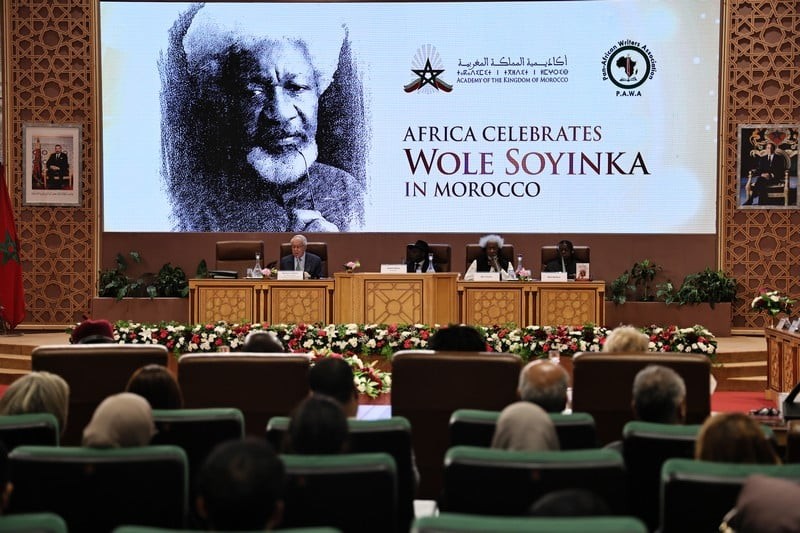
Comments